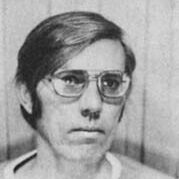Kenneth Crowe
- 1975

Fellowship Title:
- The Movement and Investment of Foreign Funds into the U.S.
Fellowship Year:
- 1975
The Foreign-Investment Watcher
The views expressed by the author in this newsletter are not necessarily the views of the Foundation. (THE CONTEXT: Foreign investment in the United States is burgeoning, while public consciousness of this perennial phenomenon has been raised by the prospect of Middle Eastern oil money buying large pieces of American corporations and real estate. The traditional investors in the U.S. have been the Europeans, but in recent years, nouveau investors…the Japanese, the Arabs, the Iranians…have appeared on the American horizon. An understanding of the impact of foreign money and foreign ownership is obscured by a lack of knowledge. The following article deals with a “foreign-investment watcher”, who turns out a monthly newsletter on the subject.) Frank Hawkinson had just turned 41 in 1973, the critical age for so many men in American society, often provoking them to change the direction of their lives in acting out the nation’s mythological dream of standing alone and independent. Hawkinson chose as his medium the publication of a newsletter on foreign investment in the United States. After 15 years
Spending The Petrodollar Billions
The views expressed by the author in this newsletter are not necessarily the views of the Foundation. (THE CONTEXT: Foreign investment in the United States is burgeoning, while public consciousness of this perennial phenomenon has been raised by the prospect of Middle Eastern oil money buying large pieces of American corporations and real estate. The traditional investors in the U.S. have been the Europeans, but in recent years, nouveau investors…the Japanese, the Arabs, the Iranians…have appeared on the American horizon. An understanding of the impact of foreign money and foreign ownership is obscured by a lack of knowledge. The following article deals with one of the new “Merchant Princes” which the surge of petrodollars has created in the United States.) Two years ago, investment banker Richard Nelson was engaged in the dance of the “Daisy Chain Flakes”, which is his term for those who go through the ritual of trying to sell General Motors or any of the other super-corporations on the Fortune 500 list to the Arabs in exchange for a pile of their
The Gathering of the Money Movers
(THE CONTEXT: Foreign investment in the United States is burgeoning, while public consciousness of this perennial phenomenon has been raised by the prospect of Middle Eastern oil money buying large pieces of American corporations and real estate. The traditional investors in the U.S. have been the Europeans, but in recent years, nouveau investors…the Japanese, the Arabs, the Iranians…have appeared on the American horizon. An understanding of the impact of foreign money and foreign ownership is obscured by a lack of knowledge. The following article deals with a Saudi Arabian businessman’s investment in an American agribusiness.) Whenever the United Nations General Assembly has met in recent years, heads of state, foreign ministers and others with the power to spend the fabled piles of petrodollars have gathered from remote parts of the Middle East into easily-accessible New York City. Considering the stories flowing out of the Middle East about American businessmen going through the exhausting “drill” of waiting long hours and days in anterooms and enduring the indignities of intestinal water bugs and sleeping on extravagently-priced cots
The Saudi Arabian Connection
(THE CONTEXT: Foreign investment in the United States is burgeoning, while public consciousness of this perennial phenomenon has been raised by the prospect of Middle Eastern oil money buying large pieces of American corporations and real estate. The traditional investors in the U.S. have been the Europeans, but in recent years, nouveau investors…the Japanese, the Arabs, the Iranians…have appeared on the American horizon. An understanding of the impact of foreign money and foreign ownersnip is obscured by a lack of knowledge. The following article traces the career of one of the Ford Administration’s most important economic policy makers from his role as a corporate executive putting together a multi-billion dollar deal in Saudi Arabia to his appointment as an Under Secretary of State.) Charles W. Robinson, the Under Secretary of State for Economic Affairs, returned from Moscow a few weeks ago with a five-year plan to sell American wheat to the Soviet Union. Missing from his porfolio was a hoped for parallel contract binding the Russians to provide oil to the United States at a
The Japanese Turn Junk into Jobs in Auburn
(THE CONTEXT: Foreign investment in the United States is burgeoning, while public consciousness of this perennial phenomenon has been raised by the prospect of Middle Eastern oil money buying large pieces of American corporations and real estate. The traditional investors in the U.S. have been the Europeans, but in recent years, nouveau investors…the Japanese, the Arabs, the Iranians…have appeared on the American horizon. An understanding of the impact of foreign money and foreign ownership is obscured by a lack of knowledge. The following is an examination of a Japanese investment in the U.S.) Everything that is attractive about foreign investment is present in the Japanese mini steel mill now under construction in Auburn, N.Y.: a new industry, new jobs, new capital, and the prospect of stimulating the American steel industry with competition and techniques designed to multiply productivity. And besides all of the above, the Japanese were invited to Auburn by the local community which is hungry for jobs and industry with their implied promise of prosperity. The Auburn Steel Co. Inc. is the first
